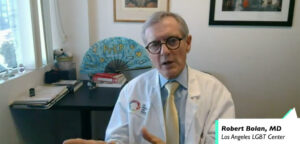By Greg Hernandez
Chief Medical Officer Dr. Robert Bolan wants the Los Angeles LGBT Center to play a bigger role in distributing COVID-19 vaccines to its clients.
“We find ourselves begging to be let into the distribution,” Bolan said during a virtual In Conversation event presented by AIDS/LifeCycle’s TogetherRide on February 3. “Right now, we are receiving dribs and drabs of vaccine supplies—100 doses a week at a time. We don’t know when the next supply is going to come.”
Because of this, Bolan said it is impossible for the Center’s Health Services to make plans to extend its vaccination reach beyond the 65 years and older population now receiving shots statewide.
 “We’re just concerned that the unique position we have in being able to get vaccines out efficiently is not being adequately recognized,” Bolan said. “We’re the best poised to reach into communities that have been disadvantaged, are suspicious about the vaccine’s efficacy, are worried about discrimination, that don’t want to show up at a vaccine place where nobody looks like them.”
“We’re just concerned that the unique position we have in being able to get vaccines out efficiently is not being adequately recognized,” Bolan said. “We’re the best poised to reach into communities that have been disadvantaged, are suspicious about the vaccine’s efficacy, are worried about discrimination, that don’t want to show up at a vaccine place where nobody looks like them.”
Help may be on the way. The Biden administration announced this week that the government will soon begin shipping vaccines directly to Federally Qualified Health Centers (FQHC), a designation given to the Center. As an FQHC, the Center receives funds to provide primary care services in underserved communities.
The Biden administration stated its priority to distribute vaccines equitably with respect to race, ethnicity, and economic status. One million doses initially will be sent to 250 of the 1,300 community health centers nationwide.
The Center received 400 doses of the Moderna vaccine and began administering them to its frontline workers, including Health Services, Security, and Facilities staff who support the Center’s various health care sites, on December 29. The second dose required for the vaccine to be fully effective was administered 28 days later.
Joining Bolan for the virtual discussion was San Francisco AIDS Foundation’s Janessa Broussard who spoke on the critical work both agencies are still doing during the pandemic, such as the implementation of telehealth.
“The DNA that runs through both of our organizations is strong, and it has a long history of responding in the midst of crisis,” Bolan said. “Even the younger folks on our staff and our teams who don’t remember the early days of the HIV epidemic have learned the passion which the rest of us have shown our community. We are not strangers to forging on in the face of adversity. The amount of resilience is remarkable. They’re here because they want to be here, they know how important is the work we do, and they draw inspiration from each other. The aspirit de corps is strong.”
TogetheRide benefits the San Francisco AIDS Foundation and the HIV and AIDS-related services of the Los Angeles LGBT Center. The event is geared for cyclists of all ages and abilities worldwide to raise critical funds and collectively pedal 1.2 million miles (representing the 1.2 million people in the United States living with HIV and AIDS).
For more information, visit togetheride.org.


